Nouveau-riche Nationalism and the Politics of Prejudice: A Case from South Korea
Gil-Soo Han / Monash University
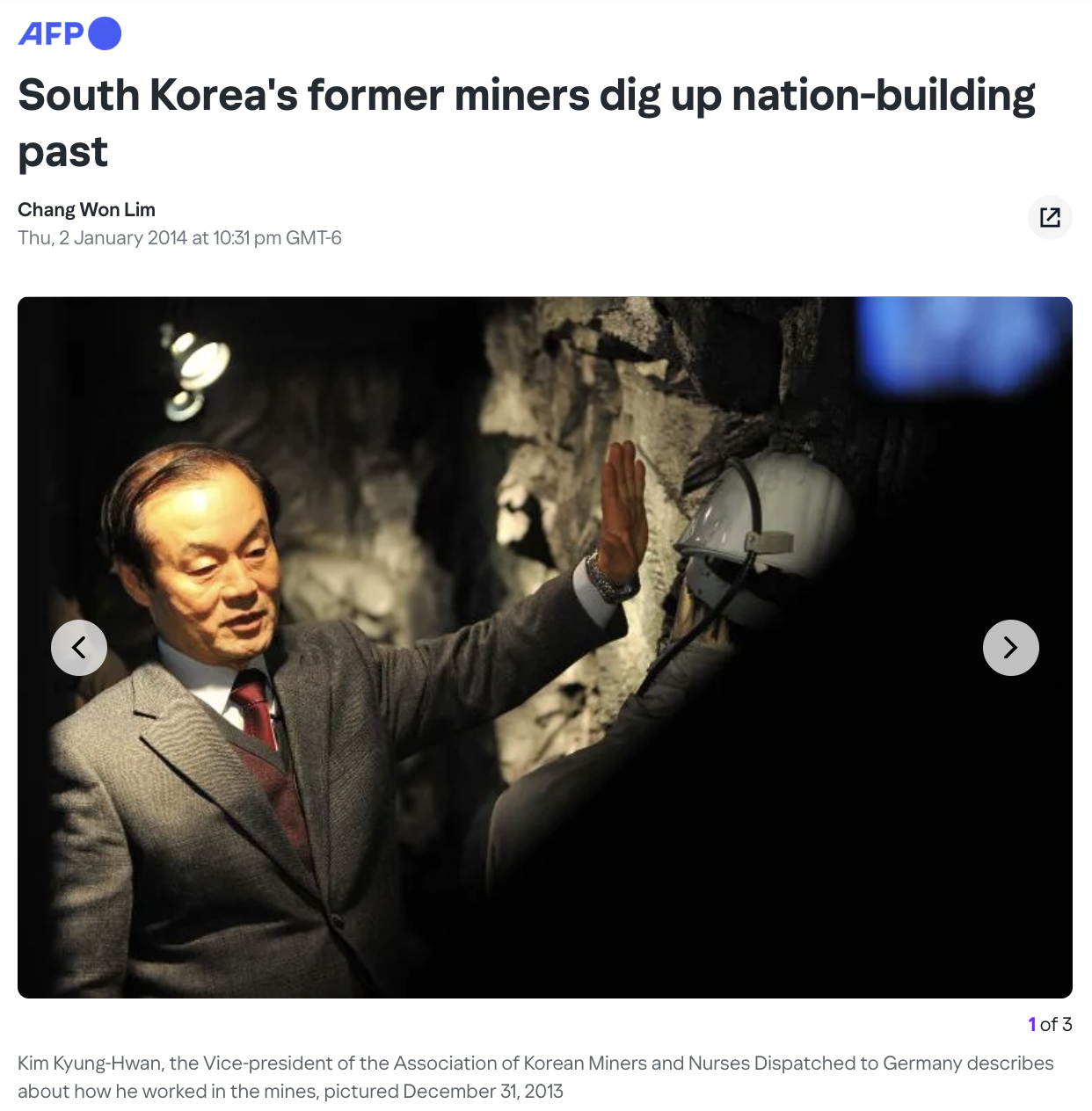
South Korea’s extraordinary transformation from one of the world’s poorest countries in the mid-20th century to a global economic powerhouse is often hailed as the “Miracle on the Han River.” This narrative, emphasizing resilience and ambition, conceals a less glamorous truth: much of the nation’s ascent was fueled by the export of human labour. Between 1963 and 1977, South Korea sent approximately 8,000 miners and 12,000 nurses to West Germany, often young and highly educated, to earn desperately needed foreign currency.[1] They endured dangerous conditions, with dozens killed and hundreds injured, yet their remittances—over $100 million—proved vital for industrialization. Contributions from Korean construction workers in the Middle East and soldiers in Vietnam further sustained the country’s early growth.[2]
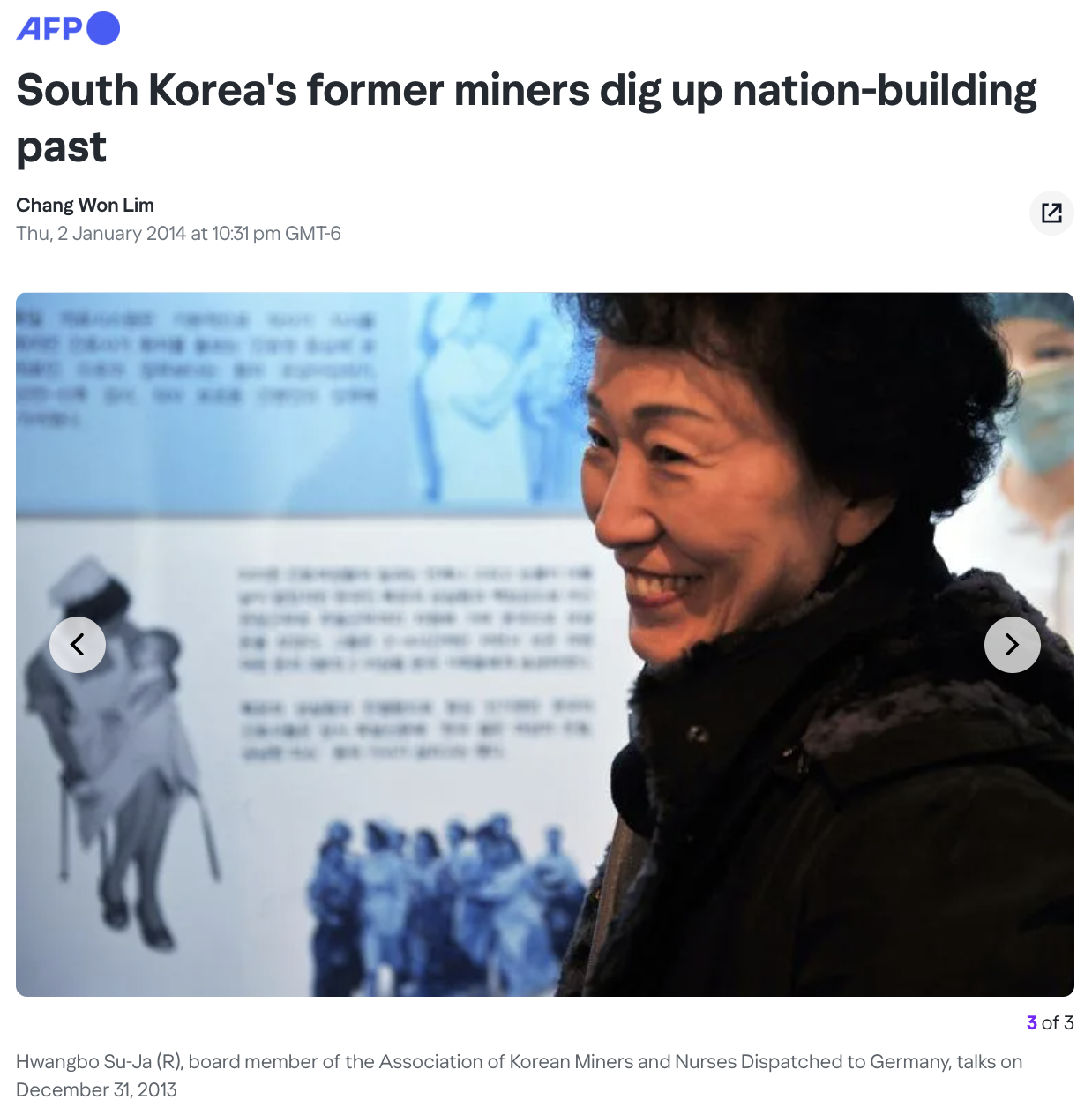
The irony is striking. At a time when South Korea’s per capita Growth National Income was only $87,[3] the sacrifices of overseas labourers, welcomed abroad, helped secure the prosperity celebrated today. However, at present, the roles have reversed. South Korea, now a developed nation, faces unprecedented demographic challenges, including the world’s lowest fertility rate (0.75) and a projected halving of its working-age population by 2070.[4] The economy increasingly depends on foreign workers to staff industries—manufacturing, agriculture, construction—that native Koreans avoid.[5] Yet instead of extending dignity to these newcomers, the country often subjects them to prejudice, sometimes harsher than what Korean migrants once endured overseas.
This reversal raises a difficult question: why has a nation built on the toil of its own migrant workers struggled to empathize with those who now do similar work within its borders? A key part of the answer lies in what I call “nouveau-riche nationalism.”
The Logic of Nouveau-riche Nationalism
This form of nationalism, not unique to South Korea, is a reproduction of South Korea’s rapid economic success, which fosters not only material pride but also a sense of cultural entitlement.[6] Nouveau-riche nationalism offered justification for Korean employers and certain Koreans to view themselves as culturally and ethnically superior; hence, their discrimination arises not merely from economic motives but from a sense of entitlement.[7] Discrimination, then, is not just about maximizing profit but about asserting hierarchy—denying dignity on the basis of presumed superiority.
This nationalism does not exist alone. It operates alongside “pure-blood nationalism,” a deeply rooted ideology emphasizing ethnic homogeneity that emerged during the Japanese occupation as a shield against racial discrimination.[8] While pure-blood nationalism privileges ancestry, nouveau-riche nationalism adds a new layer: economic superiority. The combination of these two traditions generates a powerful discriminatory force. The first draws a line around ethnic purity; the second looks outward, ranking others by the economic standing of their home countries.
Together, they explain why “new Koreans”—immigrant workers, foreign brides, children of intercultural marriages, even North Korean refugees—struggle to find acceptance despite their essential contributions.[9] Korea has accepted large numbers of such residents since the 1990s, but their treatment often reflects hierarchy rather than hospitality. My research indicates that foreign residents are often judged by the GDP of their countries of origin, a revealing indicator of nouveau-riche thinking.[10]
From Framework to Reality: The Naju Forklift Case
This ideological perspective gained chilling clarity in February 2025 with the so-called “forklift punishment” in Naju. A 31-year-old Sri Lankan worker, newly arrived in South Korea, was bound with plastic wrap and bricks to a forklift by a Korean co-worker, who lifted and moved him around a factory yard for five minutes.[11] Mocking laughter accompanied the ordeal, reducing a human being to a spectacle of humiliation. The incident was justified as a “prank” by the factory head, an excuse that revealed how normalized such dehumanization has become.[12]
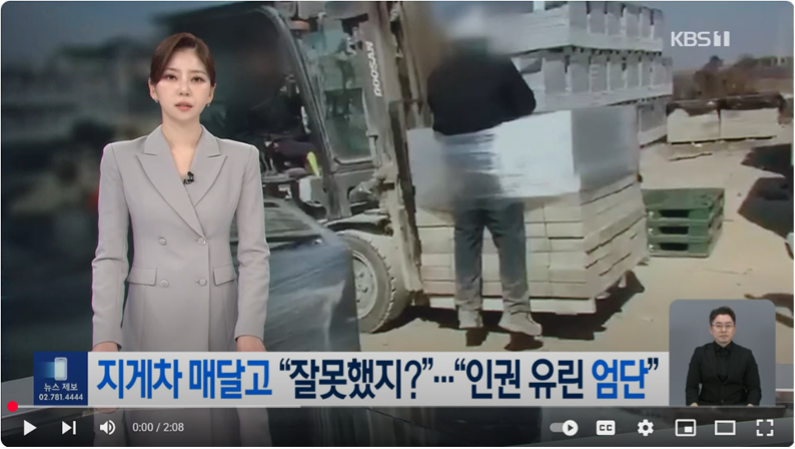
The public response was immediate. Outrage swept across the nation once the video surfaced, forcing President Lee Jae Myung to intervene. “I couldn’t believe my eyes,” he said, condemning the act as an intolerable violation of human rights.[13] The Ministry of Labour launched investigations, while activists rallied in Naju, labelling the incident “barbaric.”[14] But the fact that only graphic video evidence prompted serious action highlights a deeper problem: migrant suffering often remains invisible until spectacular abuse captures national attention.
The forklift case is not an aberration; it is a symptom. It exposes the vulnerabilities created by South Korea’s employment permit system, which grants employers wide control over foreign staff, making it difficult for workers to change jobs or escape exploitation.[15] It reveals the everyday entitlement enabled by nouveau-riche nationalism: the assumption that those from “poorer” countries can be mocked, abused, or dismissed as less than fully human.
The Struggle for Multiculturalism
Korea’s multicultural transition remains unfinished. Although foreign residents now comprise more than 4% of the population—nearing the 5% threshold often used to define multicultural societies[16]—policies remain focused on labour supply and economic growth, not inclusion. Migrant workers are excluded from the core multicultural framework, and diversity is often treated as a matter to be “managed” rather than embraced.[17][18]
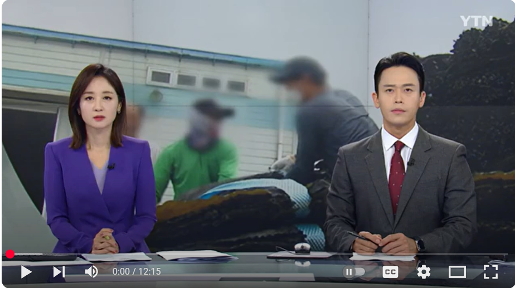
This instrumental approach has structural consequences. Without comprehensive anti-discrimination laws, migrants face daily prejudice in banking, housing, and education.[19][20] Workplace accident deaths among foreign workers are disproportionately high, rising from 7% to 12.2% of cases between 2010 and 2019.[21] Such data points underscore systemic neglect, where economic need is acknowledged but human dignity denied.
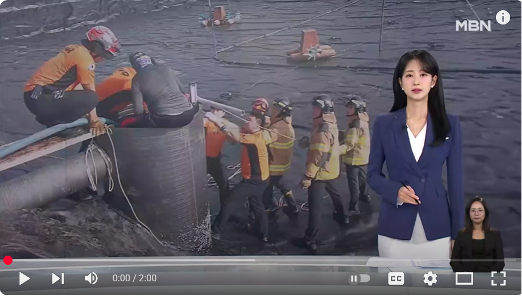
Public attitudes reflect ambivalence. A 2024 KIHASA (Korea Institute for Health and Social Affairs) survey found that over 61% of Koreans accepted foreign neighbours as “normal,” but support for welfare benefits dropped sharply when migrants were the recipients.[22] While nearly 80% supported child allowances for permanent residents, only 45% extended the same to temporary workers.[23] These contradictions reveal a society torn between economic reliance on migrants and cultural reluctance to integrate them fully.
The Naju forklift case crystallizes the dangers of allowing “nouveau-riche nationalism” to define Korea’s relationship with diversity. It shows how economic achievement can morph into arrogance, sanctioning prejudice against those whose labour sustains prosperity. Coupled with pure-blood nationalism, this ideology entrenches exclusion and justifies dehumanization.
Yet, South Korea faces an inescapable demographic reality. With a shrinking population and growing reliance on migrant labour, the country must choose between instrumental multiculturalism and genuine inclusion. As I argue, this requires more than symbolic gestures; it demands legal protections, structural reforms, and a shift in public imagination.[24] To build a cohesive society, Korea must move beyond viewing foreigners as labour units and recognize them as equal and respected members of a shared community.
South Korea once asked the world to welcome its workers with dignity. Today, it owes the same respect to those who come to its shores. The path to a truly inclusive future depends on whether it can transform nouveau-riche pride into a more generous vision of national identity—one that values human dignity as much as economic growth.
Image Credits:
- Kim Kyung-Hwan, the Vice-president of the Association of Korean Miners and Nurses Dispatched to Germany, describes his work in the mines (author’s screen grab)
- Hwangbo Su-Ja, board member of the Association of Korean Miners and Nurses Dispatched to Germany, speaks (author’s screen grab)
- 9 O’Clock News reports on human rights violations against migrant workers (author’s screen grab)
- South Korean newscasters reporting on human rights discrimination (author’s screen grab)
- South Korean news report on two workers electrocuted to death on a fish farm (author’s screen grab)
- Kim, Chang-Won. 2014. “South Korea’s former miners dig up nation-building past.” APF – Yahoo News Singapore, accessed August 12, 2025, https://sg.news.yahoo.com/south-korea-39-former-miners-dig-nation-building-043140608.html. [↩]
- Kim, Chang-Won. 2014. “South Korea’s former miners dig up nation-building past.” APF – Yahoo News Singapore, accessed August 12, 2025, https://sg.news.yahoo.com/south-korea-39-former-miners-dig-nation-building-043140608.html. [↩]
- Kim, Chang-Won. 2014. “South Korea’s former miners dig up nation-building past.” APF – Yahoo News Singapore, accessed August 12, 2025, https://sg.news.yahoo.com/south-korea-39-former-miners-dig-nation-building-043140608.html. [↩]
- Rashid, Raphael. 2025. “Integration classes and complaints offices: South Korea charts a path to a cohesive multicultural future.” The Guardian, August 7, accessed August 12, 2025, https://www.theguardian.com/world/2025/aug/07/south-korea-multicultural-country-future. [↩]
- Rashid, Raphael. 2025. “Integration classes and complaints offices: South Korea charts a path to a cohesive multicultural future.” The Guardian, August 7, accessed August 12, 2025, https://www.theguardian.com/world/2025/aug/07/south-korea-multicultural-country-future. [↩]
- Han, Gil-Soo. 2015. Nouveau-riche Nationalism and Multiculturalism in Korea: A Media Narrative Analysis. Basingstoke: Routledge.; Zmire, Zeljana. 2021. “The Impact of Ethnic Nationalism and Nouveau-Riche Nationalism on Foreign Wives’ Citizenship in South Korea.” Korea Observer, 52 (3): 483–511. See p.483. [↩]
- Han, Gil-Soo. 2015. Nouveau-riche Nationalism and Multiculturalism in Korea: A Media Narrative Analysis. Basingstoke: Routledge.; Zmire, Zeljana. 2021. “The Impact of Ethnic Nationalism and Nouveau-Riche Nationalism on Foreign Wives’ Citizenship in South Korea.” Korea Observer, 52 (3): 483–511. See p.483. [↩]
- Han, Gil-Soo. 2015. Nouveau-riche Nationalism and Multiculturalism in Korea: A Media Narrative Analysis: Book Review, By Jeong-Im Hyun. Pacific Affairs (UBC Journal), accessed August 12, 2025, https://pacificaffairs.ubc.ca/book-reviews/nouveau-riche-nationalism-and-multiculturalism-in-korea-a-media-narrative-analysis-by-gil-soo-han/. [↩]
- Han, Gil-Soo. 2015. Nouveau-riche Nationalism and Multiculturalism in Korea: A Media Narrative Analysis: Book Review, By Jeong-Im Hyun. Pacific Affairs (UBC Journal), accessed August 12, 2025, https://pacificaffairs.ubc.ca/book-reviews/nouveau-riche-nationalism-and-multiculturalism-in-korea-a-media-narrative-analysis-by-gil-soo-han/. [↩]
- Han, Gil-Soo. 2015. Nouveau-riche Nationalism and Multiculturalism in Korea: A Media Narrative Analysis. Basingstoke: Routledge.; Zmire, Zeljana. 2021. “The Impact of Ethnic Nationalism and Nouveau-Riche Nationalism on Foreign Wives’ Citizenship in South Korea.” Korea Observer, 52 (3): 483–511. See p.483. [↩]
- Business & Human Rights Resource Centre. 2025. “S. Korea: Sri Lankan worker tied to forklift as ‘punishment’ at a brick factory in Naju, authorities launch investigation, incl. co. comments.” July 24, accessed August 12, 2025, https://www.business-humanrights.org/en/latest-news/s-korea-sri-lankan-worker-tied-to-forklift-as-punishment-at-a-brick-factory-allegedly-suffering-from-trauma-authorities-launch-investigation-incl-co-comments/. [↩]
- Business & Human Rights Resource Centre. 2025. “S. Korea: Sri Lankan worker tied to forklift as ‘punishment’ at a brick factory in Naju, authorities launch investigation, incl. co. comments.” July 24, accessed August 12, 2025, https://www.business-humanrights.org/en/latest-news/s-korea-sri-lankan-worker-tied-to-forklift-as-punishment-at-a-brick-factory-allegedly-suffering-from-trauma-authorities-launch-investigation-incl-co-comments/. [↩]
- Kim, Hyung-Jin. 2025. “South Korea’s president orders action after migrant worker abuse video.” AP News, July 25, accessed August 12, 2025, https://apnews.com/article/south-korea-sri-lanka-factory-abuses-60cb1f533cf6f7c4df5d9bce396311a6. [↩]
- Business & Human Rights Resource Centre. 2025. “S. Korea: Sri Lankan worker tied to forklift as ‘punishment’ at a brick factory in Naju, authorities launch investigation, incl. co. comments.” July 24, accessed August 12, 2025, https://www.business-humanrights.org/en/latest-news/s-korea-sri-lankan-worker-tied-to-forklift-as-punishment-at-a-brick-factory-allegedly-suffering-from-trauma-authorities-launch-investigation-incl-co-comments/. [↩]
- Rashid, Raphael. 2025. “Integration classes and complaints offices: South Korea charts a path to a cohesive multicultural future.” The Guardian, August 7, accessed August 12, 2025, https://www.theguardian.com/world/2025/aug/07/south-korea-multicultural-country-future. [↩]
- Rashid, Raphael. 2025. “Integration classes and complaints offices: South Korea charts a path to a cohesive multicultural future.” The Guardian, August 7, accessed August 12, 2025, https://www.theguardian.com/world/2025/aug/07/south-korea-multicultural-country-future. [↩]
- Kim, Nam-Kook. 2014. “Multicultural Challenges in Korea: The Current Stage and a Prospect.” International Migration, 52 (2): 100–121. See p.119. [↩]
- Lim, Timothy. 2020. The Road to Multiculturalism in South Korea: Ideas, Discourse, and Institutional Change in a Homogenous Nation-State. New York: Routledge.. [↩]
- Rashid, Raphael. 2025. “Integration classes and complaints offices: South Korea charts a path to a cohesive multicultural future.” The Guardian, August 7, accessed August 12, 2025, https://www.theguardian.com/world/2025/aug/07/south-korea-multicultural-country-future. [↩]
- Seol, Dong-Hoon & Seo, Jungmin. 2014. “Dynamics of Ethnic Nationalism and Hierarchical Nationhood: Korean Nation and Its Otherness since the Late 1980s.” Korea Journal, 54 (2): 5–33. [↩]
- Kim, Hyung-Jin. 2025. “South Korea’s president orders action after migrant worker abuse video.” AP News, July 25, accessed August 12, 2025, https://apnews.com/article/south-korea-sri-lanka-factory-abuses-60cb1f533cf6f7c4df5d9bce396311a6. [↩]
- Rashid, Raphael. 2025. “Integration classes and complaints offices: South Korea charts a path to a cohesive multicultural future.” The Guardian, August 7, accessed August 12, 2025, https://www.theguardian.com/world/2025/aug/07/south-korea-multicultural-country-future. [↩]
- Rashid, Raphael. 2025. “Integration classes and complaints offices: South Korea charts a path to a cohesive multicultural future.” The Guardian, August 7, accessed August 12, 2025, https://www.theguardian.com/world/2025/aug/07/south-korea-multicultural-country-future. [↩]
- Han, Gil-Soo. 2015. Nouveau-riche Nationalism and Multiculturalism in Korea: A Media Narrative Analysis: Book Review, By Jeong-Im Hyun. Pacific Affairs (UBC Journal), accessed August 12, 2025, https://pacificaffairs.ubc.ca/book-reviews/nouveau-riche-nationalism-and-multiculturalism-in-korea-a-media-narrative-analysis-by-gil-soo-han/. [↩]